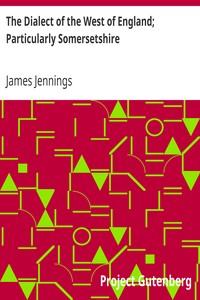The Dialect of the West of England; Particularly Somersetshire by James Jennings
"The Dialect of the West of England; Particularly Somersetshire" by James Jennings is a linguistic exploration written in the late 19th century. The work is a detailed examination of the Somerset dialect, featuring a glossary of terms currently used in the area, alongside poems and literary pieces that exemplify the unique linguistic features of the dialect. Jennings seeks to preserve and highlight the regional language, which is characterized by its ancestral ties
to the Anglo-Saxon language, making it a significant study for both linguists and enthusiasts of local culture. The opening of the book includes a dedication and prefaces that frame its purpose and significance. Jennings expresses his affection for the West and his desire to document the peculiarities of the Somerset dialect, which he believes retains much of its Anglo-Saxon heritage due to its geographical separation from urban centers. The text features poetic verses that demonstrate local dialectical expressions, and Jennings refers to observations made over years of residence in Somerset, acknowledging contributions made by others in the field of dialect studies. He outlines the dialect's distinct grammatical structures, vocabulary, and sounds, indicating the depth of the work that contributes to the understanding of regional linguistic identity. (This is an automatically generated summary.)
Read or download for free
| How to read | Url | Size | |||
|---|---|---|---|---|---|
| Read now! | https://www.gutenberg.org/ebooks/7453.html.images | 285 kB | |||
| EPUB3 (E-readers incl. Send-to-Kindle) | https://www.gutenberg.org/ebooks/7453.epub3.images | 194 kB | |||
| EPUB (older E-readers) | https://www.gutenberg.org/ebooks/7453.epub.images | 196 kB | |||
| EPUB (no images, older E-readers) | https://www.gutenberg.org/ebooks/7453.epub.noimages | 164 kB | |||
| Kindle | https://www.gutenberg.org/ebooks/7453.kf8.images | 484 kB | |||
| older Kindles | https://www.gutenberg.org/ebooks/7453.kindle.images | 423 kB | |||
| Plain Text UTF-8 | https://www.gutenberg.org/ebooks/7453.txt.utf-8 | 216 kB | |||
| Download HTML (zip) | https://www.gutenberg.org/cache/epub/7453/pg7453-h.zip | 192 kB | |||
| There may be more files related to this item. | |||||
Similar Books
About this eBook
| Author | Jennings, James, 1772-1833 |
|---|---|
| Title | The Dialect of the West of England; Particularly Somersetshire |
| Credits | Produced by Miranda van de Heijning, David Starner, and the Online Distributed Proofreading Team |
| Reading Level | Reading ease score: 82.2 (6th grade). Easy to read. |
| Language | English |
| LoC Class | PE: Language and Literatures: English |
| Subject | English language -- Dialects -- England -- Somerset |
| Category | Text |
| EBook-No. | 7453 |
| Release Date | Feb 1, 2005 |
| Most Recently Updated | Dec 30, 2020 |
| Copyright Status | Public domain in the USA. |
| Downloads | 214 downloads in the last 30 days. |
| Project Gutenberg eBooks are always free! | |

